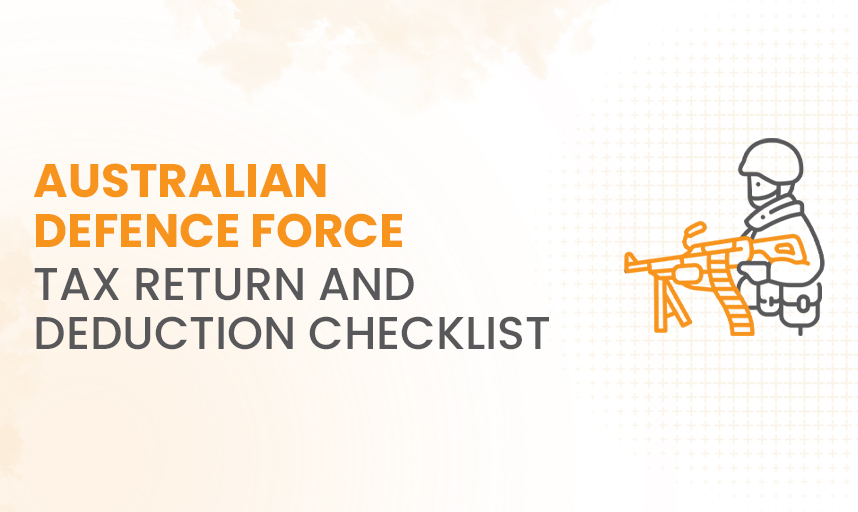Australian Defence Force Tax Return and Deduction Checklist

As a member of the Australian Defence Force (ADF), you dedicate your life to protecting our nation.
Serving in the Australian Defence Force (ADF) is a demanding yet rewarding career, and taxation should not add unnecessary stress.
But fear not, this blog is to simplify all possible deductions that you can claim as an ADF and get the maximum refund possible.
Tax Deductions for ADF Members
Australian Defence Force members, including those from the Royal Australian Navy, Army, and Air Force, are eligible for various tax deductions on their annual returns.
However, it’s crucial to understand that only expenses directly related to ADF duties can be claimed as deductions. Personal or household expenses do not qualify.
To maximise your tax return, it’s essential to keep track of your work-related expenses throughout the year. The Australian Taxation Office (ATO) recommends using tools like the myDeductions app to record and upload your expenses.
What Can You Claim as an Australian Defence Force Personnel?
Here’s a table outlining some common deductible expenses for ADF members:
| Category | Deductible Expenses | Expenses |
| Clothing & Uniform | Purchase, repair, maintenance, and laundry of compulsory uniform items (e.g., shirts, trousers, jackets, mess uniform, hats, service dress) |
|
| Protective Clothing & Footwear | Items not provided by the ADF that reduce injury risk (e.g., fire-resistant clothing, safety boots, gloves, glasses) |
|
| Work Tools & Equipment | Items required for work purposes (e.g., specific tools, watches with special features) |
|
| Travel | Work-related travel expenses (e.g., flights, accommodation, meals, car expenses) for attending meetings, conferences, or visiting bases |
|
| Car Expenses | Travel between work locations, transporting bulky equipment, or using your car for approved work purposes (calculated using cents per kilometre method or logbook method) |
|
| Self-Education | Courses directly related to your current position and income-earning activities (e.g., language courses, textbooks, travel to study location) |
|
| Home Office | Portion of home office expenses used for work purposes (e.g., heating/cooling, internet, phone bills, depreciation of equipment) |
|
| Mess Fees | Portion of compulsory mess fees related to work activities | Contacting your mess committee to determine the work-related portion of your mess fees. |
| Overtime Meal Expenses | Meals purchased while working overtime, if covered by an official meal allowance | Receipts for meals purchased during extended work hours, with a record of the overtime meal allowance received. |
| Extra Regimental Duties (ERDs) | Work-related expenses incurred during ERDs | Costs associated with travel, meals, and accommodation for approved ERD activities. |
What Can't You Claim? Knowing the Limits
While there are many deductions available, some expenses are strictly non-deductible. Understanding these can prevent you from making errors on your tax return. Here’s a quick rundown of non-deductible expenses:
- Regular Clothing: Clothes you can wear outside of work, even if purchased specifically for work (e.g., leggings, white t-shirts).
- Upfront Agency Fees: Joining fees, search fees, or upfront payments to secure work with the ADF.
- Audition Costs: Expenses related to preparing for or attending auditions (seen as seeking work, not performing work).
- Childcare: Expenses associated with childcare while you work.
- New Skill Development: Courses unrelated to your current ADF area (e.g., acting classes for a theatre usher).
- General Meals: The cost of meals or snacks consumed during a regular workday.
- Entertainment: Expenses for attending award nights, galas, social functions, concerts, or similar events, even if industry-related.
- Gifts: Costs of buying gifts (flowers, alcohol) for fellow performers, producers, or directors.
- Pay TV & Streaming: Fees for pay television and streaming services unless demonstrably used for work research (needs detailed logging).
- General Fitness: Gym memberships, weight loss programs, vitamins for general health and fitness (unless required for a high-demand role like a dancer).
- General Grooming: Hairstyling and makeup expenses for maintaining a generally professional appearance.
- Commuting: Travel expenses between your home and regular workplace, regardless of the distance.
- Prescription Glasses: Costs of regular prescription glasses or contact lenses (unless tinted for a role).
Zone & Overseas Forces Tax Offsets - Reducing Your Tax Bill
In addition to deductions, ADF members may be eligible for tax offsets that further reduce their tax payable amount. Here’s a breakdown of the two most common offsets:
- Zone Tax Offset: This benefit applies to ADF members residing in remote or isolated parts of Australia for at least 183 days during the tax year. Refer to the ATO’s list of Australian zones to see if your location qualifies.
- Overseas Forces Tax Offset: This offset is available to ADF members who served overseas for at least 183 days in a designated area on eligible duty or as part of a disciplined force (e.g., peacekeeping).
How Can Expert Tax Consultation Help?
Filling your tax return can be challenging but the expert tax professionals at KPG Taxation can be really helpful! Their registered tax experts will offer personalised tax advice so that you can approach tax time with confidence and maximise your tax refund. This will also allow you to focus on your important service to Australia.
- Categories
- Tax Return

Focus On Growing Your Business, Leave The Accounting On Us!
- Income Tax : File your taxes & get the best claims & returns.
- Accountancy : Hire expert accountants to manage your transactions.
- Bookkeeping : Let us handle your record books and expense reports.
- Business Advisory : From company set-up to payroll, we handle it all.



